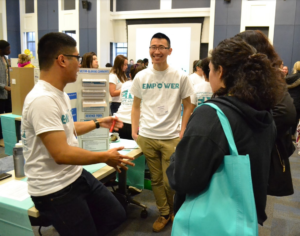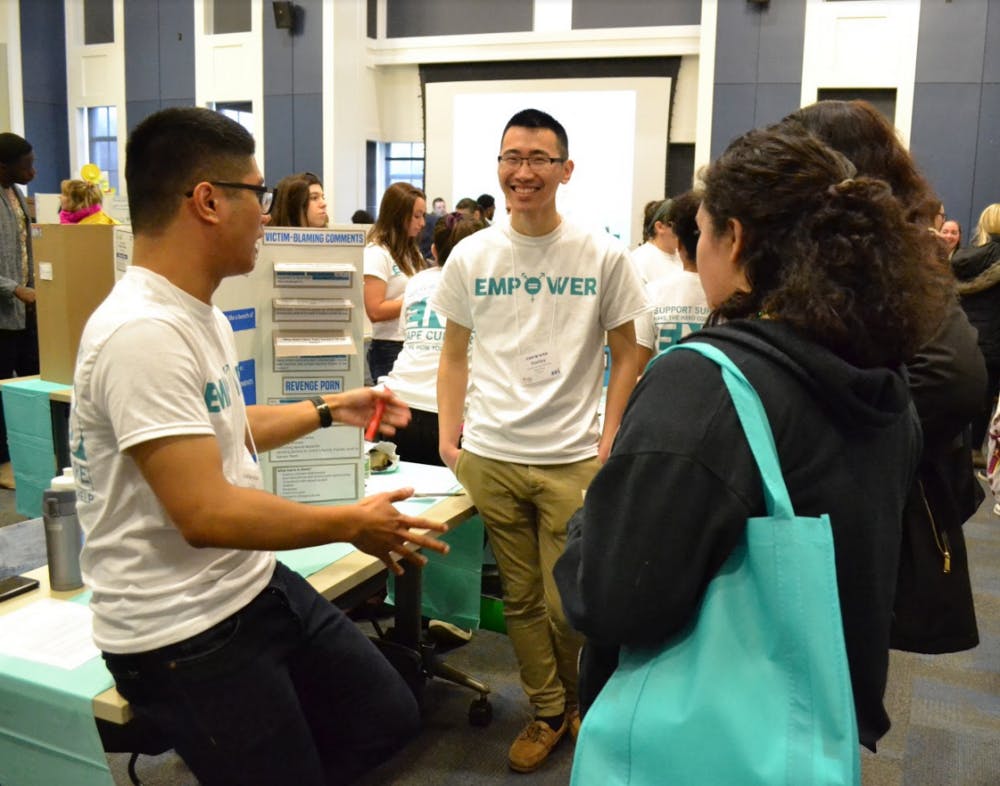By Gabriela Rey
Staff Writer
As students proudly sported T-shirts with bold letters reading “Support Survivors,” the College community joined forces to educate others about sexual assault and rape at A Day to End Rape Culture on Tuesday, April 10 in the Education Building.
The expo-style event sought to engage students and faculty in addressing and recognizing rape culture. Hosted by Anti-Violence Initiatives, which promotes a campus environment that is intolerant of abuse and responsive to victims and survivors, the event featured student-run interactive exhibits that discussed different aspects of rape culture, ranging from alcohol and consent, to sexual violence in the digital age.

The third annual event at the College seamlessly corresponded with Sexual Assault Awareness Month.
“We really want to emphasize your sexuality as a really multifaceted thing instead of making it as simple as ‘I like boys’ or ‘I like girls,’” said Molly Knapp, a junior public health and women’s, gender and sexuality studies double major.
As an AVI Peer Educator, Knapp said that the organization works with other groups on campus and presents programs on being a bystander, sexuality, relationships and masculinity. AVI wants to have uncomfortable conversations about sex, but formulate and present these conversations in a way that creates a level of comfort and leads to discussion. The organization’s booth featured the ‘slices of sexuality,’ which was an activity drawing parallels between ordering a pizza, which is a comfortable area for many, and sex, which isn’t.
Another table at the event discussed intersectionality and the correlation between personal identities and susceptibility to sexual assault.
“Everyone has a number of different identities including race, age, gender and sexuality. Taking these identities into account creates different experiences for everyone, especially around sexual assault,” said Elysia Jones, a senior English major. “When you’re thinking about solutions for the problem of sexual assault, being able to pinpoint the communities that are most at risk can help you solve the problem at large.”
All of the exhibits aimed to provide solutions to the most prevalent issues regarding rape culture. Many brought awareness to resources and programs held at the College, including Residential Education, Campus Police and Womanspace.
“Womanspace has been working with the College for many years and works with trained volunteers to provide counseling, housing and shelter to those involved in cases of domestic violence, sexual assault and human trafficking,” said Susan Adams, coordinator for volunteers and community research at Womanspace. “They respond to calls of sexual assault on college campuses and work with Campus Police to ensure the safety, security and confidentiality of victims.”
AVI encourages its Peer Educators to provide the education and information to the campus community to help students make smart and safe decisions.
“I know a lot of people get really scared thinking about what’s happening on campus or what’s happening in the world,” Knapp said. “It’s really important to keep it in the back of your mind and just constantly ask ‘What can I do to make someone feel safe?’”
The expo is one of many events that work to change perception of rape culture, especially on college campuses, and brought to light the importance of conversation regarding sexual assault, healthy relationships and overall safety.
“DERC is an amazing event that is able to educate the community through fun activities and interesting discussions,” said Odalys Quito, a junior sociology major. “What I like are the people who table their program because you can see how passionate they are. I love going every year because I learn something new with each table and person.”







